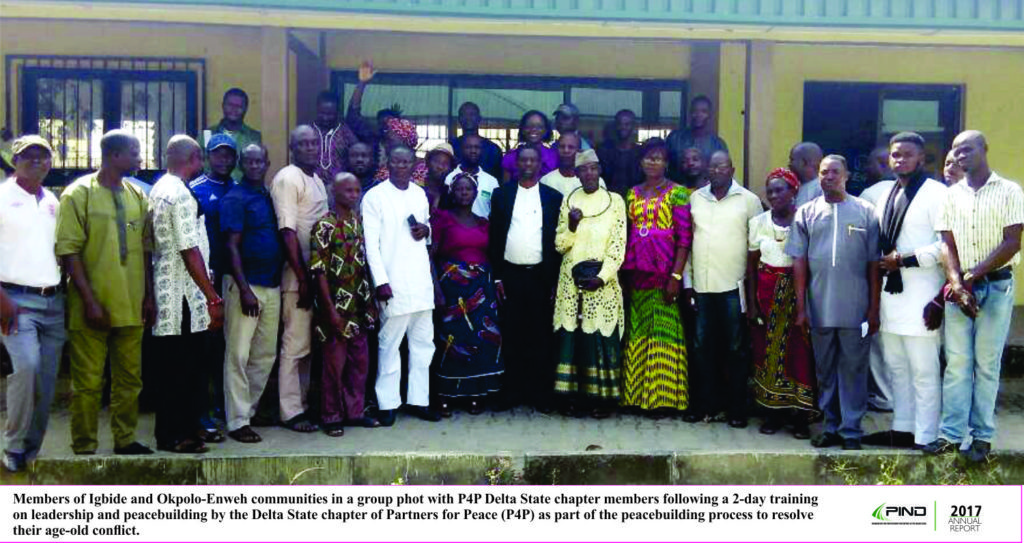 An over 50 year old land boundary dispute between two neighboring communities, Igbidi and Okpolo-Enweh in Isoko South Local Government Area of Delta State resurged into fresh conflict in June 2017. Both communities are predominantly food crop and fish farmers, with people coming from other towns to buy proceeds from the women. The conflict brought everything to a halt, along with loss of lives and living on the edge of anxiety.
An over 50 year old land boundary dispute between two neighboring communities, Igbidi and Okpolo-Enweh in Isoko South Local Government Area of Delta State resurged into fresh conflict in June 2017. Both communities are predominantly food crop and fish farmers, with people coming from other towns to buy proceeds from the women. The conflict brought everything to a halt, along with loss of lives and living on the edge of anxiety.
Elder Isaac Omeke is a past President General of the Okpolo-Enweh Clan Progress Union and has held several leadership positions in the community. ‘’Nobody can access the fish ponds and the farms in the bush because of the war. In fact, there is hunger in the community now’’ he laments.
Dr Patrick Harrison Ogbongho, President General of Igbidi Community corroborates this. ‘’People can no longer go to their farms without being afraid or attacked. So they are not going as frequently as they should’’ he corroborates.
Many stakeholders, including government and elites from both communities made efforts to de-escalate the issue but to no avail. Then the Delta State chapter of the Partners for Peace (P4P) Network intervened.
Elder Omeke recalls ‘’they (P4P) arranged for a Peace Seminar between the two communities which we attended quite alright. They gave us lectures, showing us how to live peacefully as two communities’’. For Igbidi community, he says ‘’ they (P4P) wrote to us inviting us to the local government council to brainstorm on how to end the conflict. And they did a very nice job.’’
Uzezi Sharon Agbo is a member of the Delta State P4P Network. ‘’The conflict between Igbidi and Okpolo-Enweh communities was a very distressful situation’’ he recalls.
Peacebuilding is a process. ‘’Each conflict has its own dynamics and requires different approaches’’ Uzezi explains. ‘’We engaged and consulted with various stakeholders, did training to bring everybody to accept a common voice, had dialogues and even did the one on one informal way of peacebuilding and conflict management.’’
The process led to a ceasefire. ‘’Right from that place (the seminar), both communities resolved to embrace peace’’ narrates Dr Ogbongho and ‘’ the two communities agreed that they would not attack each other again’’ shares Elder Omeke.
While P4P continues to support them to work out the modalities on how to put up a temporary boundary for the two communities so that nobody can encroach, the ceasefire has brought relief as it restored some semblance of peace in both communities. And both communities credit P4P for the relative peace they are currently enjoying.
‘’Since they (P4P) have talked to both parties, there is no more fighting, no more problem, there is peace for now. People can sleep with their eyes closed’’ Elder Omeke confirms while Dr Ogbongho expresses same, saying ‘’ I don’t think there has been any kind of hostilities since the P4P organization came. And we promise to build on that’’. ‘’Peace is what we need in the two communities so that our socio-economic activities can return to what it was before the crisis’’ further adds Igbidi Community leader, Elder Omeke.
The people believe the work of P4P can significantly reduce incidents of conflict in the region. Dr Ogbongo requests that ‘’the P4P should continue what they are doing. In fact, by bringing their work to the grassroots as they have done, issues like fighting and killing will be reduced if not even wiped out’’.
While the communities credit P4P for the fostered peace, Uzezi credits PIND for empowering them to serve the communities.
‘’PIND has continued to build our capacity in terms of the CAPABLE training. I must be grateful to PIND for using us to make sure that things are done well because we wouldn’t have known that dialoguing would help us until after the training’’ says Uzezi, adding that they now play more role towards broader peacebuilding in the region by contributing conflict data to the early warning system, a role he reveres.
‘’We are the eyes of PIND so we must provide accurate information to help us map conflicts and promote peace building in each of the communities’’.



